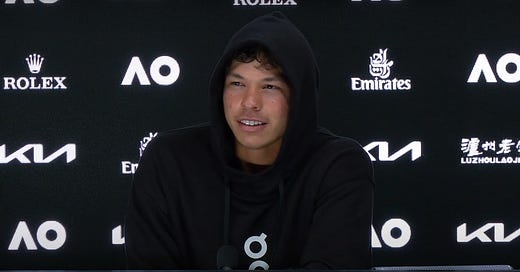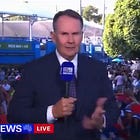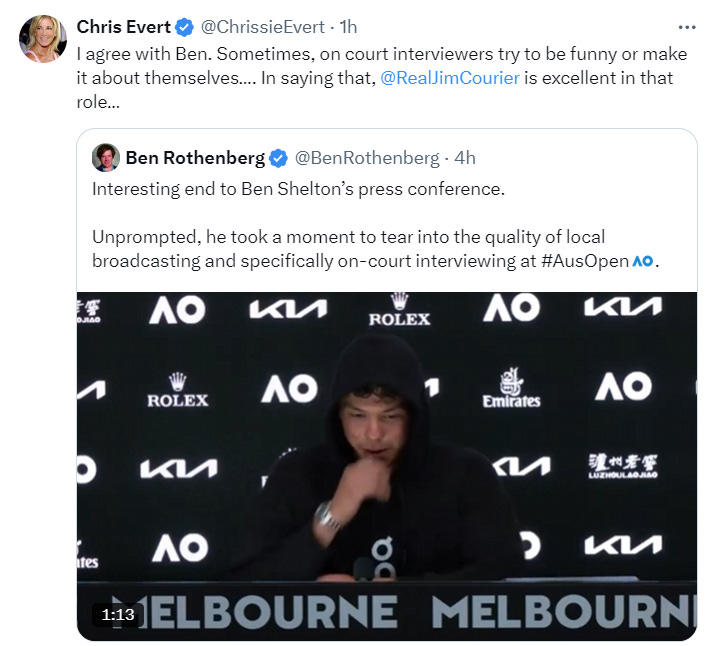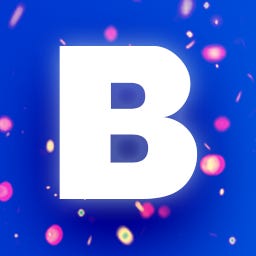Ben Shelton Takes the Mic
The American semifinalist has had enough of awkward Australian Open attempts at on-court banter.
MELBOURNE, Australia — For the second time in four days at the Australian Open, the big story became a player’s criticisms of the Australian broadcast personnel at the event.
Three days after Novak Djokovic announced his boycott of Channel Nine—and two days after he ended that boycott—one of his fellow men’s singles semifinalists sounded off about the level of discourse in the Australian Open on-court interviews.
22-year-old American Ben Shelton was wrapping up the post-match press conference that followed his four-set win over Lorenzo Sonego in a Wednesday afternoon quarterfinal when, once the last question had been answered, he said he had something else he wanted to address:
“One thing that I just want to say before we're done: I've been a little bit shocked this week with how players have been treated by the broadcasters.
“I don't think that the guy who mocked Novak, I don't think that was just a single event. I've noticed it with different people, not just myself. I noticed it with Learner Tien in one of his matches. I think when he beat Medvedev his post-match interview, I thought it was kind of embarrassing and disrespectful that interview.
“There are some comments that have been made to me in post-match interviews by a couple of different guys, whether it was, ‘Hey, Monfils is old enough to be your dad. Maybe he is your dad.’ Or today on the court, ‘Hey, Ben, how does it feel that no matter who you play in your next match, no one is going to be cheering for you?’
“I mean, may be true! But I just don't think the comment is respectful from a guy I've never met before in my life.
“I feel like broadcasters should be helping us grow our sport and help these athletes who just won matches on the biggest stage enjoy one of their biggest moments. I feel like there's just been a lot of negativity. I think that's something that needs to change.”
Before getting into the general topic of on-court interviews, let’s look back at the moments Shelton mentioned.
The Interviews that Upset Ben Shelton
Aside from mentioning the Tony Jones-Novak Djokovic situation, Ben Shelton listed off three specific interview moments at this Australian Open, so let’s go through those in reverse-chronological order starting with today’s.
It’s worth saying, also, that these interviewers whom Shelton singled out all work for Tennis Australia’s World Feed, not Channel Nine, so the technical target of his displeasure is different than Djokovic’s.
Ben Shelton’s On-Court Interview After His Quarterfinal:
Shelton started this interview in an ebullient, effusive mood, shouting out the shotmaking of his opponent Lorenzo Sonego and expressing overall satisfaction.
“This is one of my favorite matches in my career, so thank you guys so much,” Shelton said.
The interviewer James Sherry then immediately turned the mood negative: “You’re going to play either Jannik Sinner or Alex de Minaur—the crowd are going to be on the other guy’s side for that, aren’t they?”
Shelton laughed nervously, and tried to play along. “Well I mean, if it’s the home favorite, Alex de Minaur, 100 percent. You guys can boo me. You can throw stuff at my head. I understand: home guy. And if it’s the Number One in the world, it will probably be the same. So I’m looking forward to it. I know I’ve got a few people out in the crowd who are going to be pulling for me, too.”
That buzzkill was the last question Shelton got; it was a quick interview by necessity, since the day session had run long and there were thousands of ticket holders waiting outside Rod Laver Arena for the night session.
Ben Shelton’s On-Court Interview After His Fourth Round:
Shelton’s on-court interviewer for his fourth round match was Roger Rasheed, an Australian tennis coach who had previously coached Monfils (which is likely why he was assigned this match, in case Monfils had won).
The clunkiest moment of this interview happened right out of the gate, when Rasheed mentioned Monfils, who had retired from the match early in the fourth set.
“On Gael, he’s an entertainer,” Rasheed began. “What does he mean to you? Well, he’s almost your dad. Not really. Sorry, Bryan. You stay there—I’m going to get to you. Yeah, talk to us a little bit about Gael.”
“Was that a Black joke?” Shelton replied, drawing groans from the crowd and laughter from his father, Bryan Shelton.
“I’m not sure, I’m not sure,” Rasheed stammered. “Let’s not go there.”
Shelton’s unprompted comments on Wednesday, criticizing the interviews, had clearly had been pre-planned, and perhaps were formulated—either by himself or after discussions with others—about how he’d answered an initial question two days earlier about the awkwardness of his on-court exchange with Rasheed in his previous press conference after that match.
Q. There was a slightly awkward moment on the court afterwards when you were asked, being interviewed, and asked whether Gael felt like he could be your dad, and you made a comment, Is that a Black joke? Did you take it as a racial comment? You were laughing at the time.
BEN SHELTON: No, no, the guy just said, He's old enough to be your dad. Then he made a comment, Oh, maybe he is your dad. Probably just a stupid comment that I shouldn't have said. I thought it was funny in the moment.
I don't think -- I hope the guy didn't take it in any sort of way. I know that my dad thought it was pretty funny (smiling). But, yeah, I guess I apologize for that.
No, I didn't take it any way. I know he didn't -- he probably didn't mean it any way to me. I hope he didn't mean it in any way like that. I guess I probably should keep my mouth shut more.
At that point, Shelton was deferential and even apologetic. “I guess I should keep my mouth shut more,” Shelton concluded.
Two days later, Shelton no longer wanted to be deferential or demure on the topic, and decided to speak his mind instead.
Learner Tien’s On-Court Interview After His Second Round:
There was so much going on in Learner Tien’s stunning second round win over Daniil Medvedev—stunningly good tennis from both, a new star, a stunning upset, a finish near 3 a.m., $66,000 in fines against Medvedev (who abruptly skipped his press conference)—that few, besides Ben Shelton, dwelled on Tien’s on-court interview.
But in the moment, it was deeply strange and uncomfortable.
John Fitzgerald, a 63-year-old Australian tennis player from the 80s and 90s, was interviewing 19-year-old Tien well past midnight but not doing the most basic part of interviewing: asking questions.
“19-year-olds are not meant to be that good,” Fitzgerald said, then pointed the microphone at Tien.
Tien, who had just played for four hours and 48 minutes, didn’t know how to answer the statement.
“I mean, I don’t know what to say to that,” Tien said.
Fitzgerald then followed up: “Well, I’m here to tell you: that was pretty good,” drawing applause from the ~1,000 or so who had lingered in Margaret Court Arena until that late hour.
Fitzgerald then incongruously mentioned having previously lived in California near Tien, and then said it was the first time a five-setter had gone to a super tiebreak this year.
Again, that wasn’t a question, either, but he pointed the microphone at Tien once more.
“You don’t know what to say to that either, do you,” Fitzgerald said after Tien had been silent, sounding unimpressed.
Fitzgerald’s third attempt at a question was better—or at least actually a question—about how Tien had recovered from losing the third set.
“Honestly, in the fourth set, I just had to pee so bad,” Tien volunteered during the ensuing answer.
“Well, that makes two of us, Learner,” Fitzgerald offered.
After asking Tien about his third round opponent, Corentin Moutet—who himself got slapped with big fines this week1—Fitzgerald gave up and just handed Tien the microphone, which Tien used to make a pseudo-speech, something usually only seen after tournament finals.
The Art of the Australian Open Interview:
I hadn’t been planning on writing this article, honestly, until seeing how much interest Shelton’s remarks generated when I posted them on Twitter. The algorithms on Twitter have mostly buried me since the Elon Musk takeover—which is a big part of why I’m glad so many of you have migrated here to Bounces with me—and hopefully if you’re here you can subscribe so we can stay connected even as the Bird App loses more and more of its feathers.
But this tweet with Shelton’s remarks broke through, quickly becoming my most viewed tweet in many months.
One of the reactions was from Chris Evert, who expressed a common sentiment: agreeing with Shelton while singling out Jim Courier for praise.
Courier, whose popularity and celebrity status is far greater in Australia than it is in the United States2, has made the longform Australian Open on-court interview into something of its own genre, with mixed results from others who have attempted to perform in the category. Part of why it was so jarring when Djokovic declined his interview after his fourth round win was because an interview with Courier really has become part of the show here.
It’s not uncommon for Courier’s interviews to last the length of a typical talk show guest spot; his chat with Jannik Sinner tonight lasted seven minutes.
Jelena Dokic, though she doesn’t have Courier’s batting average or slugging percentage at the plate, also often gets nice interviews with WTA players here.
But though Courier has made it look easy at times, the risk often isn’t worth the reward when it comes to these interactions. On-court interviewing—a tennis media role I should add that I’ve never done personally—often relies on trust and rapport between player and interviewer, and that can take a long time to build up to be able to pull off high-reward gambits. Some of the best at it are tennis media veterans who have worked many courts at many tournaments around the tour—like Blair Henley or Nick McCarvel, both of whom are working in non-on-court roles for the Australian Open.
Shelton specified in his comment that he had a hard time with the jokes coming from “a guy I've never met before in my life.” Putting Australian interviewers whom these tennis players don’t see at any other time of the year hasn’t worked out for the tournament in the way of banter.
I understand what the interviewers are going for, but being able to do unscripted comedy takes time invested over the course of months or even years with a scene partner—it can’t be spontaneously created within the first couple minutes of meeting someone.
For more on this topic, as well as a wrap of the quarterfinals and a look ahead to the semifinals, I spoke with Tumaini Carayol on a new episode of No Challenges Remaining out tonight (the topic of Shelton’s remarks and on-court interviews starts 29 minutes in).
Thanks for reading Bounces! -Ben
Moutet was fined $15,000 for unsportsmanlike conduct during his second round win over Mitchell Krueger. His rant included the following:
[At 2-2 in second set, 15-all]
Moutet: "Noooooo! Mais non, man! Mais non. Show me the replay. What the fuck, man, how can you call this not-up? Something like this, you call the wrong ball? Stop being like, 'Why are you pissed?' I'm pissed because you call the wrong ball. That's the problem: you have one thing to watch. You can't focus on this and do mistake, that's insane..."
Chair umpire: "Code violation: Audible obscenity."
Moutet: "...because I'm not staying calm. It's your mistake, you give me a code. It's your mistake. It's your mistake, it's your mistake...Man it's always the same. You guys do error or mistake and you are surprised we are pissed about it. Of course I'm pissed about it. Who is shocked about what I said? It's crazy man, you are tripping. Every time it's the same shit with you guys It's crazy. It's crazy. It's crazy. It's crazy. It's your mistake. It's crazy. It's crazy. It's your mistake and you are acting like I did a mistake. Take it out. Take out the warning. Cancel it. Cancel it. Cancel it right now...Now you make everybody lose time because of your mistake. Now we are losing 10 minutes. You're getting paid to getting paid for that How is that possible? One thing. One thing. And now everybody's losing time because of your call. Oh my god."
Moutet, still going: "It's crazy, man, it's crazy. Every time the same. Every time. Every time. Who is this guy? I never saw him on a court. Some random guy in the chair. It's a grand slam."
[Supervisor comes out 3.5 minutes later; inaudible conversation]
Annoyed woman in stands: "Get on with the match!"
[At 2-3 changeover]:
Moutet: "How can you give one euro for guys like this?! How? How can you waste euros like this? Or Australian dollars, whatever. How is this possible? Come on, man! Man, every night, all the referees are getting drunk here. And then the next day, they are ruining the game. How is that possible, man? I'm here fighting, I'm working every day. I'm fighting to be here. And they are ruining the game like this. And I'm supposed to stay calm? How is that possible?"
Something Courier shares with both P!nk and myself, probably.










This was a great article and prompted me to finally become a paid subscriber. Waking up this morning in the US and hearing murmurs about this Ben Shelton interview, I was so pleased that you had brought the entire chain of events together in one place, presented with a thoughtful take, and sent it to my inbox. So grateful in the age of ChatGPT and a focus on dramatic headlines to be able to read quality and in-depth tennis journalism written by a human. Thank you
This is a good topic but it’s pretty straightforward. Interviewing is a skill, just like everything else. There is no reason to think that a former tennis player would be good at it. John Fitzgerald is particularly bad at it. You could pick any random person out of the crowd and they would likely do better. Jim Courier, for whatever reason (though my guess is that he worked hard at it), is good. But we shouldn’t expect former players to be good at it. Nick McCarvel and Blair Henley are good because they have journalism experience. The only thing mildly surprising here is that Courier is good at it. The rest is just what we should expect.